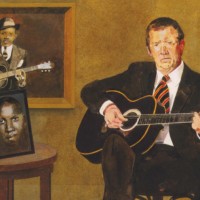A rakish character, to be sure, Sonny Boy Williamson II wore a bowler hat and custom-made two-tone three-piece suit, often regaled the crowds with a hands-free harp solo, even took the name of a once-more famous predecessor in order to jump start his career.
Williamson, then, was the perfect America export, over the top and completely original. More particularly, he bridged the gap between the old blues and the kids who were popularizing its sound to a new generation: He played with both Robert Johnson and Eric Clapton, with Elmore James and Robbie Robertson.
Yet Sonny Boy II never stopped building on his own unique sound — despite, yes, the sleight-of-hand moniker change — nor lost a deep-seated connection with own stomping grounds.
A complete accounting, however, of his live performances — much less Williamson’s early-1960s overseas appearances during that decade’s folk-music revival — remained elusive for years. Then came the long-awaited “In Europe,” recorded as part of the celebrated American Folk Blues Festival tours, founded by Memphis Slim and Chess recording legend Willie Dixon, among others.
Part of this album could be originally found on the early 1970s release “Blues Bash,” from Buddah Records. Other tracks had been scattered across compilations over the years. The best of these shows appear in this seminal 1995 compilation on Evidence.
Born Aleck “Rice” Miller in Glendora, Miss., just before the turn of the last century, Sonny Boy actually swiped his name from the earlier hit maker John Lee Williamson, who died in 1948. There is no doubt, however, on the authenticity or power in these storytelling blues cuts — the only live recordings made by Sonny Boy II.
Nine showcase Williamson in on-stage appearances with the Yardbirds, featuring a young Clapton, perhaps the most interesting to fans of boomer rock. As tasty as this full-circle collaboration is, principally because of Clapton’s biting asides, the appearances were a mess. Some blame the lack of chemistry on Sonny Boy’s disdain for practicing, some on a toothache, others on whiskey.
 These dates are ably complemented on “In Europe” by five tunes featuring Otis Spann (the famed Muddy Waters sideman), Hubert Sumlin (often associated with mentor Howlin’ Wolf, whom Williamson taught to play harmonica), Dixon and Matt “Guitar” Murphy, among others. Each demonstrates, actually in a much deeper way, why Williamson’s gutty, elemental style played such a key role in American rock music.
These dates are ably complemented on “In Europe” by five tunes featuring Otis Spann (the famed Muddy Waters sideman), Hubert Sumlin (often associated with mentor Howlin’ Wolf, whom Williamson taught to play harmonica), Dixon and Matt “Guitar” Murphy, among others. Each demonstrates, actually in a much deeper way, why Williamson’s gutty, elemental style played such a key role in American rock music.
Williamson later performed with the Animals; had his tune “Eyesight to the Blind” recorded by Aerosmith (on “Honkin’ on Bobo”) and the Who, as the only tune not written by the band in the rock opera “Tommy”; and saw “One Way Out” popularized by the Allman Brothers Band. Led Zeppelin did “Bring It On Home” and Jimmy Page is on the original version of “I’m Trying to Make London My Home,” which opens this recording. There would be no Rolling Stones, much less Blues Traveller, if there had been no Sonny Boy II.
Cuts like “Dissatisfied” and “Take It Easy Baby” (embedded below) on this album become a definitive in-concert genealogy toward that influence. In the end, they had to be: The last of these recordings, made in October 1964 in Hamburg, Germany, would be among Williamson’s last.
He returned home to Arkansas, to his regular broadcast engagement, the King Biscuit Time show on Helena’s legendary station KFFA, and to the old clubs he’d once frequented. Not long after, on May 25, 1965, Williamson would be found dead in bed by drummer Peck Curtis — who’d come to fetch him for a radio date.
The story goes, perhaps edging into mythology, that Williamson had been playing a juke joint recently with the Hawks, an early incarnation of a group including Levon Helm that later backed Bob Dylan during his electric debut before striking out as The Band. Robertson, then the Band’s guitarist, said he noticed Williamson stopping to spit throughout the evening, and assumed he was chewing tobacco.
As they left the stage, Robertson glanced down and realized the can was filled with blood. Williamson had come home to die.
- Nick DeRiso’s Best of 2015 (Rock + Pop): Death Cab for Cutie, Joe Jackson, Toto + Others - January 18, 2016
- Nick DeRiso’s Best of 2015 (Blues, Jazz + R&B): Boz Scaggs, Gavin Harrison, Alabama Shakes - January 10, 2016
- Nick DeRiso’s Best of 2015 (Reissues + Live): John Oates, Led Zeppelin, Yes, Faces + others - January 7, 2016



